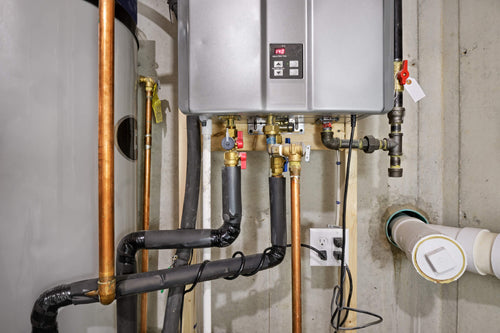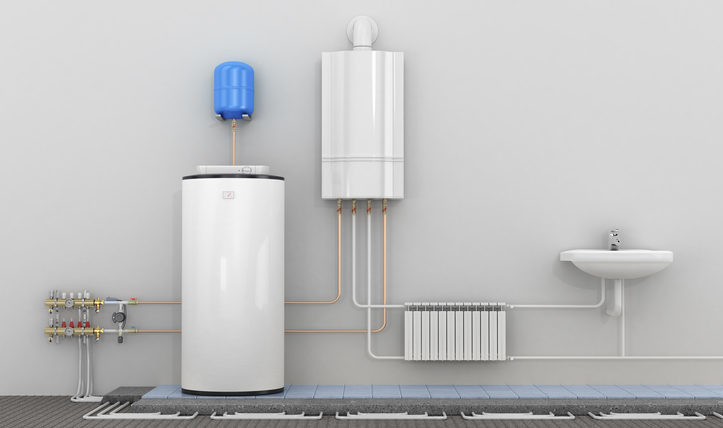Elevating Household Convenience: The Benefits Of Tankless Water Heaters
Elevating Household Convenience: The Benefits Of Tankless Water Heaters
Blog Article
We have found this great article relating to Why You Should Consider a Tankless Water Heater down the page on the web and think it made sense to discuss it with you over here.

In a globe where benefit and performance preponderate, it's no surprise that property owners are regularly in search of smarter methods to manage their home's energy consumption and convenience. One technology that has actually continuously gotten popularity is the tankless water heater. Yet what exactly makes these systems stick out from the traditional tank-based versions most of us matured with? Allow's dive in and explore the benefits of tankless water heaters, helping you determine if it's time to make the switch in your home.
Intro
Image this: you step into the shower after a lengthy day, expecting a soothing waterfall of warm water, just to be greeted by icy droplets due to the fact that the last person used it all up. Audio familiar? Conventional hot water heater store a set amount of hot water, meaning you go to the mercy of that container's supply. Tankless systems, on the other hand, heat water on demand. Say goodbye to running out mid-shower, say goodbye to wrestling with schedules just to guarantee hot water is readily available.
Comprehending Tankless Hot Water Heater
What Are Tankless Water Heaters?
Tankless hot water heater, occasionally referred to as on-demand or immediate hot water heater, provide warm water just as it's required. Instead of keeping gallons of pre-heated water, these systems kick right into activity the minute you turn on the tap. Water goes through a heat exchanger, heating up in real-time, suggesting you obtain an uninterrupted circulation of warm water without the requirement for a large tank sitting lazily by.
Exactly how Do They Differ from Traditional Equipments?
Standard heaters hold a reservoir of warm water, utilizing power to maintain that container at a constant temperature level. Tankless units eliminate the standing supply, cutting down on lost power and the bulky impact of a big cylinder. Essentially, you're updating from a "stockpile" frame of mind to a "made-to-order" strategy.
Common Kinds Of Tankless Units
Tankless water heaters generally can be found in two selections: gas and electric. Gas designs often tend to provide higher flow prices, ideal for larger houses, while electric models usually offer smaller homes and are usually less complicated to mount. Furthermore, some systems are made for point-of-use (serving one component) while others can manage the entire home's warm water demands.
Trick Benefits of Tankless Hot Water Heater
1. Unlimited Hot Water Supply
Ever before needed to set up showers so every person obtains their reasonable share of hot water? With tankless, that ends up being a distant memory. As long as the heating unit's circulation capacity isn't exceeded, you can take back-to-back showers without becoming a popsicle.
2. Power Performance and Expense Cost Savings
No more warming a giant storage tank's well worth of water and keeping it toasty all day. Tankless heating systems lower standby energy losses, which can reduce utility expenses. While the preliminary expense might be greater, the long-term savings frequently warrant the financial investment.
3. Space-Saving Style
If your home is short on storage, eliminating the cumbersome tank maximizes valuable space. Tankless systems are small and can usually be installed on walls, stashed in edges, or mounted in limited utility closets without grabbing all of the entire room.
4. Longer Lifespan
A well-maintained tankless hot water heater can outlast its tank-based relative. Typical containers might last 10-15 years, while tankless versions can keep downing along for twenty years or even more, making them a solid financial investment in time.
5. Improved Water Quality
Storing water in a container can occasionally lead to debris build-up or a somewhat "off" preference. With tankless systems, fresh water is heated on the spot, decreasing the possibilities of debris buildup and potentially supplying cleaner-tasting water.
Factors to consider Before Switching
Though the advantages are compelling, it's important to think about a few elements prior to fully committing.
First Investment Prices
Tankless heating systems normally include a higher in advance price tag. Between the unit itself and possible installment modifications, the initial price could provide you sticker shock. But bear in mind to view it as a long-term financial investment.
Setup Needs
Depending upon your home's infrastructure, you may need added electrical capacity or gas line upgrades. Guarantee you understand the installation requirements and consult with a professional to stay clear of shocks.
Assessing Your Home's Water Usage Patterns
If your home at the same time uses several fixtures with high warm water demand, see to it the device's circulation price satisfies your requirements. Recognizing your use patterns helps you select the appropriate dimension and kind of tankless heating unit.
Maintenance and Treatment Tips
Tankless systems are fairly low maintenance, yet they aren't set-it-and-forget-it devices.
Normal Cleansing and Descaling
Hard water minerals can build up in the warmth exchanger, impacting efficiency. Routine descaling (often suggested each year) maintains the device running at peak performance.
Annual Specialist Evaluations
A yearly checkup from a professional makes sure minor issues are caught early. They'll analyze the system's performance, try to find leakages, and help maintain ideal performance.
Guaranteeing Correct Air Flow
For gas models, proper ventilation is important to securely get rid of exhaust gases. See to it airing vent systems are tidy and appropriately mounted to stop any kind of possible safety and security dangers.
Comparing Different Brands and Designs
Not all tankless water heaters are developed equivalent.
Looking Into Trusted Suppliers
Look for trusted brand names with a history of generating top quality units. A trusted supplier often offers much better client support and longer warranties.
Reviewing Evaluations and Customer Comments
User reviews and responses from neighbors or friends that have gone tankless can offer valuable understandings. In some cases, real-life experiences can be extra telling than advertising and marketing pamphlets.
Installment: DIY or Specialist?
While some homeowners enjoy taking on jobs themselves, tankless installation could not be the best time to break out the tool kit.
Benefits and drawbacks of Do It Yourself Setup
A DIY mount might save money, but it includes threats. Wrong setup can cause ineffectiveness or safety problems. If you come in handy and have experience, it may be possible-- but proceed with caution.
When to Call a Professional Plumbing Professional
For the majority of, calling a professional makes certain everything's done properly. A professional plumber comprehends regional codes, sizing requirements, and venting criteria, lowering the risk of accidents.
Making best use of Performance
You've purchased a tankless device-- now optimize its efficiency.
Optimal Temperature Setups
The majority of people set their devices in between 120-140 F. Adjusting the temperature can boost comfort and savings. Experiment to find a pleasant spot that does not waste power.
Coupling With Low-Flow Fixtures
Intend to stretch your system's capabilities? Take into consideration setting up low-flow showerheads and taps. They minimize water use, enabling your tankless system to supply a constant stream of warm water without stressing.
Ecological Effect
Tankless water heaters straighten with greener living goals.
Reduced Carbon Footprint
By utilizing less energy and just home heating water as required, tankless systems can reduce your home's carbon footprint, decreasing your environmental effect.
Preserving Natural Resources
Less power usage and much less lost hot water translate right into less natural resources being made use of, an ecological win-win.
Who Benefits Many from Tankless Heating systems?
The appeal of tankless heaters is that they can fit a range of households.
Huge Families vs. Solitary Occupants
Large families could enjoy the unlimited hot water supply, while solitary passengers value the power financial savings from not warming an entire tank for simply one person's morning shower.
Property Owners with Limited Area
If your home is short on square video, shedding the cumbersome storage tank maximizes space for other essentials-- or perhaps simply much more breathing space.
Eco-Conscious Consumers
Going tankless aligns with eco-friendly values, ensuring you're not losing power or sources.
Future Trends in Tankless Hot Water Heater
The world of home appliances is ever-evolving, and tankless water heaters are no exemption.
Smart Home Combination
Visualize readjusting your hot water heater's temperature through an application or getting upkeep informs on your phone. As smart home technology advances, we'll see more connection and convenience.
Developments in Technology
R&D is constantly enhancing warmth exchangers, making units more reliable and sturdy. Future versions could be also quieter, more portable, and much better fit for differing environments.
Conclusion
Choosing a tankless water heater is greater than just updating your home's warm water system; it's purchasing long-lasting convenience, energy performance, and a greener way of life. By considering your home's water usage, being mindful of installment needs, and dedicating to routine upkeep, you can enjoy a constant stream of warm water without the luggage of a large storage tank. As modern technology progresses, you can eagerly anticipate also smarter, a lot more effective tankless solutions that not just make your life easier but likewise profit the world.
Pros and Cons of Tankless Water Heaters
Tankless Water Heater Pros
Saves Energy: Simply put, you re spending less energy to create hot water, so your total carbon footprint goes down, not to mention your bills. Lasts Longer Than Storage Tanks: Storage tank units need to be replaced every 15 years or so. But tankless units? They can last for 30 years before they give out on you. Constant Hot Water: Need to take a shower and don t want the water running cold? Awesome it won t. The water will stay hot the entire time because it creates hot water on demand. Saves You Money: Less water usage equals less money. Beyond that, you re not paying to keep water hot 24/7. Those savings add up quickly. Better for the Environment: Less water waste is better for everyone. It saves you money, but it s also environmentally conscious at the same time. Tankless Water Heater Cons
It Can Take a Minute: Depending on your specific unit and its placement, it can take anywhere from 10 seconds to 2 minutes to fully heat up. Because there s no storage tank, it heats water as you need it. Upfront Purchase Price: While we talked about their longevity, there s sticker shock when you look at brand-new tankless units to install. It pays for itself, but it s still a big chunk of change at first. Has its Limits: If you run multiple appliances at once, such as the dishwasher, washing machine, and maybe you take a shower at the same time, there might not be enough hot water. https://www.airsouthnow.com/blog/water-heater-service/pros-and-cons-of-tankless-water-heaters/

I'm certainly very fascinated with and I really hope you appreciated the entire blog entry. For those who appreciated our post plz be sure to share it. Many thanks for being here. Please visit our blog back soon.
Top Article Report this page